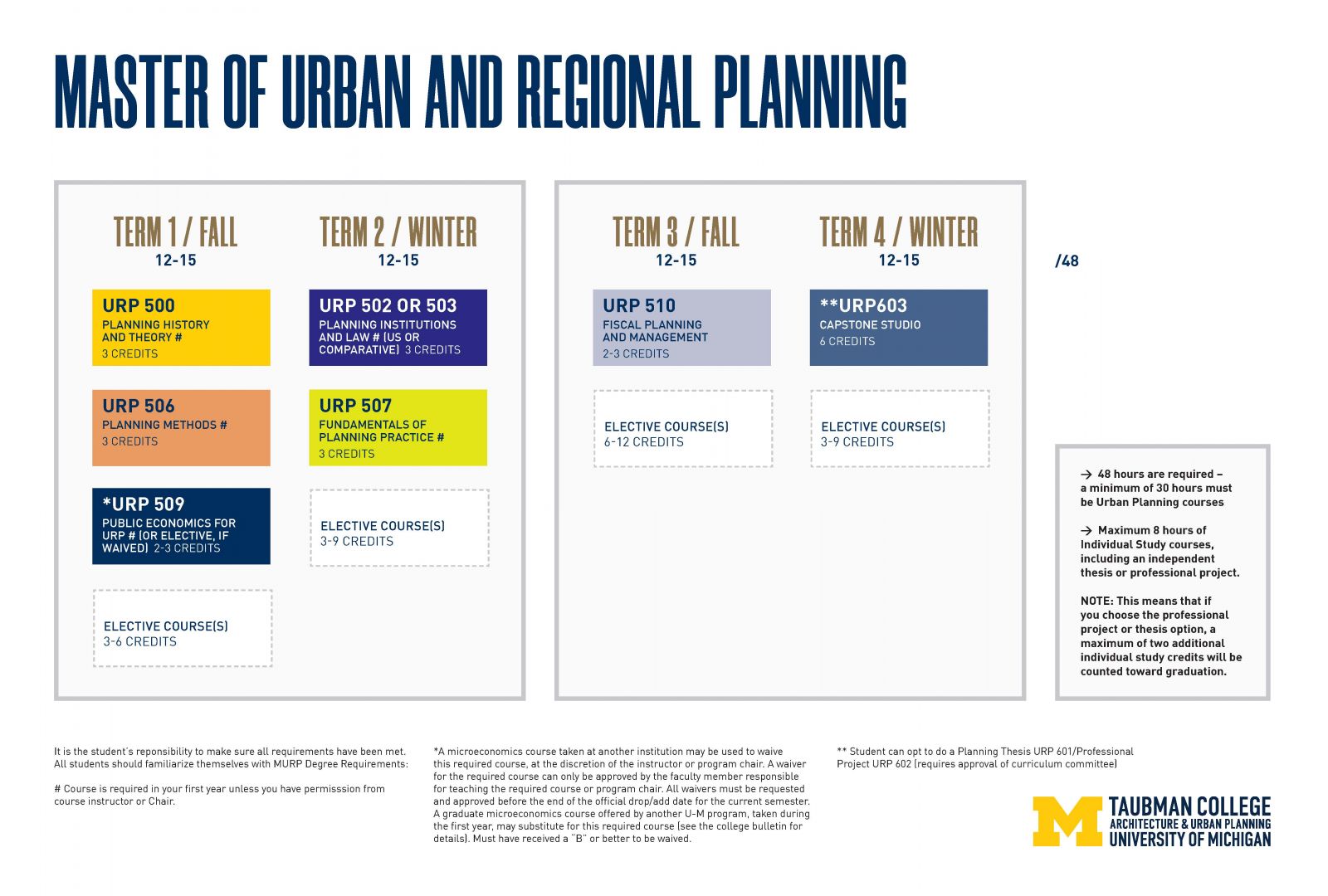MURP Degree Information

Students should always refer to the specific degree requirements from the year they entered.
It is the student’s responsibility to make sure all requirements have been met. All students should familiarize themselves with the degree requirements.
In order to obtain the Master of Urban and Regional Planning degree, a student must fulfill the following requirements:
- The student must complete a minimum of 48 approved credit hours, of which:
- a minimum of 30 hours must be in graduate-level urban and regional planning courses; and
- no more than eight hours may be counted from among individual study-type courses (i.e., URP 612, 613, 601, or 602).
- The student must complete all core courses, unless waived by the program chair or the faculty member who teaches a specific core course.
- Each student must complete a course in economics (URP 509), if not waived due to successful completion of an undergraduate course. See course waiver process below.
- Courses outside of the program are not required but students are encouraged to explore their areas of interest.
Each student must earn an overall grade point average of “B” (3.0) or better while enrolled in the program.
Incoming students are assigned a faculty advisor with whom programs of study, course alternatives, focus areas, and career objectives are explored. The advising procedure within the program varies according to the individual student’s needs and their evolution through the four terms of study. Students are encouraged to seek advice from any and all of the program faculty.
All students should develop a study plan using the curriculum diagram below. The student should reconsider and revise the study plan in consultation with their advisor each term. Maintaining contact with Taubman College Advising throughout your studies will allow you to understand your progression toward degree completion in a timely fashion.
M.U.R.P. Core Courses
Generally, students take the majority of their courses during the first year from among the offerings of the Urban and Regional Planning Program. A series of core courses serves to give the student a broad-based knowledge of planning. These classes deal with urban and regional planning analysis, history and theory, professional practice, and the social, economic, political, legal, and physical aspects of planning. If a student already possesses an acceptable level of competence in an area covered by a core course, an elective may be substituted. The determination as to whether or not a student possesses an acceptable level of competence will be made by the respective instructor in a core course in consultation with the student, their advisor, and the program chair.

View the Master of Urban and Regional Planning sample schedule (PDF)
| Course | Credit Hours |
|---|---|
| URP 500 Planning History and Theory | 3 |
| URP 502 U.S. Planning Institutions and Law or URP 503 Comparative Planning Institutions and Law | 3 |
| URP 506 Planning Methods | 3 |
| URP 507 Fundamentals of Planning Practice | 3 |
| URP 509 Public Economics for Urban Planning** (for those who have not taken economics) | 2 required of a 3-credit course |
| URP 510 Fiscal Planning and Management | 2 required of a 3-credit course |
| URP 603 Capstone Studio or URP 601 Planning Thesis/URP 602 Professional Project | 6 |
** Or a microeconomics course taken (and passed with a “B” or better) prior to program entry, or a corresponding course taken in a U-M graduate program.
Normally, the program offers three first-year core courses in the fall semester: URP 500 (Planning Theory), URP 506 (Planning Methods) and URP 509 (Public Economics), and two core courses in the winter semester URP 502/503 (Planning Law) and URP 507 (Fundamentals of Planning Practice). In addition to these core courses, first-year students should plan to take at least one elective each term. M.U.R.P. students typically take the remaining two core courses during the second year: URP 510 (fall semester) and URP 603 (winter semester). Students must complete an exit project during their final semester.
Course Waiver(s)
Course waivers should be requested upon your arrival in the fall and approved before the end of the official drop/add period for the current semester. Course waivers do not reduce the 48 credit hour requirement. If you have taken a microeconomics course during your undergraduate studies, or if you are a current U-M student doing a dual degree and you have taken this course in a U-M graduate program, and you have received a grade of at least a B in the course, you may be able to waive URP 509.
Take the form linked below along with a copy of your transcript to the instructor of the course you are requesting to be waived. The instructor will then review your transcript and approve the course waiver form. This form is then returned to Taubman College Advising and placed in your file. A course waiver may also be subject to review by the Chair of the program.
Grades of No Report/Incompletes
Students are expected to complete all course assignments in full and on time according to the course schedule established by the instructor. Consistent with Rackham policy, if a student fails to attend a substantial portion of course lectures and fails to complete a substantial number of the assignments for a course, the instructor will assign a “No Report.” This grade will be converted automatically by the university to an involuntary withdrawal (ED) after the end of a term. Students who receive an NR will be required to retake the course.
Students are occasionally hindered from completing all of the requirements of a course because of unforeseen hardships. In that event, the instructor, at his or her discretion, may assign a grade of “Incomplete” for the course. Following Rackham policy, the instructor may assign an Incomplete only if the student has attended a substantial portion of the course lectures and completed a substantial portion of the required work.
When assigning an Incomplete, the instructor will consult promptly with the student to determine the nature of the student’s hardship, establish the remaining work to be completed, and set a reasonable deadline for its completion. That deadline should be set as soon after the end of the term as possible and should not exceed two months following the end of the term, except under exceptional circumstances. The instructor will notify both the student and Taubman College Advising of the work remaining and the deadline(s) for completing that work in writing, which may be by email communications.
If the student completes all of the required work by the deadline, the instructor will assign the student’s final grade by incorporating all of the completed work. If the student fails to complete all or part of the remaining work by the extended deadline, the instructor will assign the final course grade based on the work completed before the end of the term and before the extended deadline. In either case, because the notation “I” remains a permanent part of the academic record according to Rackham policy, the final grade as it appears on the student’s transcript will be noted, for example, as “I B+.”
FAQs
Are there opportunities for hybrid, virtual, or part time courses?

Courses are offered fully in-person. The M.U.R.P. program is a full-time program and does not offer part-time options.
Is it required or expected of me to reach out to the Faculty before I apply?

No, but you are welcome to reach out to any faculty member that you want to connect with.
I do not have an undergraduate degree in urban planning, will my application be considered for this program?

Yes, we accept students from various backgrounds of study and work experience.
My English proficiency score doesn’t meet the minimum requirement, can I still apply?

Yes, you can still apply. However, Taubman College doesn’t provide conditional admission. We encourage you to retake the test until you receive the minimum score.
Will I be considered for assistantships when I apply for admission?

Taubman College assistantships are available for students to apply after one semester enrolled. Please review the Paying for Your Degree webpage for additional funding resources.
When will I receive my admission decision?

Applicants will be notified of their admission decision by late February or early March. If you are admitted, you will see that you have been recommended for admission via the online Wolverine Access web application status portal. Decision letters are sent via email. Any merit scholarship award decisions made by the Program Chair will be noted in the letter of admission.
When do I need to enter my decision?

April 15th. Students choosing to accept admission to the Master of Science must pay a $500 enrollment deposit. Payment may be completed online by e-check through Wolverine Access, credit card, or in the form of a check or money order (in US dollars) made payable to University of Michigan. This deposit reserves your space in the program. The $500 payment will be credited to your student account and applied toward your tuition.





